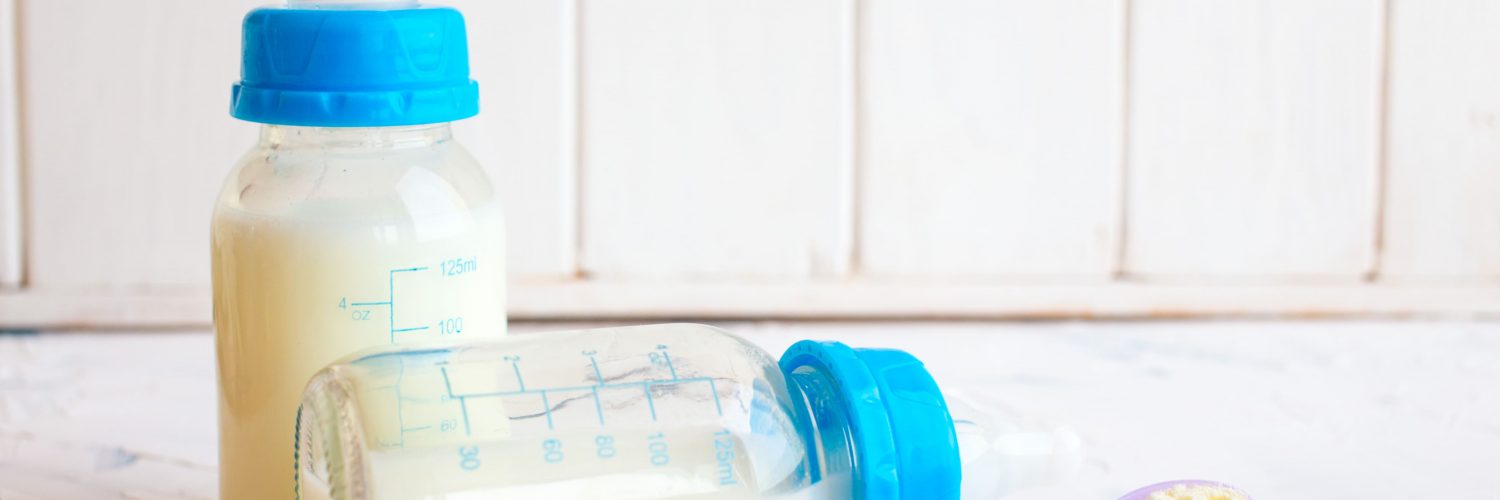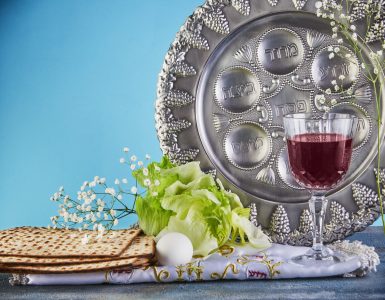The laws of Pikuach Nefesh require a Jew to take any actions necessary to save a life, even if this requires violating Shabbos. Sometimes, when faced with a case of Pikuach Nefesh, there will be two options. The first is to use the same intervention that one would normally use (e.g., on a weekday). The second is to use an effective but unusual – and sometimes, unnatural – intervention. If the first option involves Chillul Shabbos but the second does not, may one choose the first option?
This is the subject of a fascinating Halachic discourse that has ramifications in many contexts.[1] In this essay, we will further illustrate the practical applications of this discussion, beginning with one of the original questions raised in this area, namely, whether infant formula should be used instead of expressing breastmilk on Shabbos.
In the past, breastfeeding was the exclusive way to feed babies. Without access to breastmilk, a baby would die. Therefore, babies whose mothers could not nurse them required the services of a wet nurse. The American Academy of Pediatrics recommends exclusive breastfeeding without supplementation for the first six months of a baby’s life[2] as studies have demonstrated a reduced incidence of upper respiratory tract infections, gastrointestinal infections, and the risk of diabetes with exclusive breastfeeding during the first six months of life.
According to Chaza”l, the normal duration of breastfeeding is twenty-four months (Kesubos 59b). Chaza”l even permit breastfeeding women to use contraceptives to ensure the constant supply of breastmilk to the baby; “Three women may have intercourse with a Moch (diaphragm): a minor, a pregnant woman, and a breastfeeding woman… lest she [become pregnant and prematurely] wean her child [off milk] and he will die” (Yevamos 12b). We will examine the extent of the danger faced by a baby who is deprived of breastmilk through the eyes of Chaza”l later in this essay.
Over the past century, the baby formula industry came onto the scene. These formulas are based on cow’s milk or soy proteins and combined with many other nutrients, and are alternative options for mothers who are unable or unwilling to breastfeed their babies. Even mothers who do breastfeed may choose to supplement their babies’ diets with formula for various reasons, including inadequate milk supply. Today, infant formula is part of the diet of millions of babies the world over. This method of feeding, although deemed second-best by professionals, is nonetheless effective and safe. Moreover, due to extensive research and development, the composition of baby formula is constantly improving, and formulas are available for babies with a wide range of dietary sensitivities.
Therefore, the question arises of whether it is ever justified to pump breastmilk for a baby on Shabbos given the availability of breastmilk substitutes.
To answer this question we must first review why breastfeeding is ever permitted on Shabbos. After all, breastfeeding involves extracting milk from the mammary glands and removing it from the mother’s body. This is “Mefarek”, a subcategory of the Melacha of “Dash” (threshing). There is an Issur d’Oraisa to milk animals on Shabbos (Shabbos 95b, Rambam, Hilchos Shabbos 8:7).[3] Nonetheless, breastfeeding is permitted, as may be inferred from the Gemara’s ruling, (Shabbos 135a) “An eight-month-old is like a stone, and it is forbidden to move him. But his mother may lean over him and nurse him because of danger.”
An “eight-month-old” is a fetus born in the eighth month of pregnancy. According to Chazal, a fetus born at that age cannot survive. Therefore, it is forbidden to attend to him on Shabbos – he is just like a dead person. However, it is permissible to breastfeed him because his mother may be endangered if she does not breastfeed. We can infer from this Gemara that if the baby had been healthy, it would have been permitted to breastfeed him, without needing to invoke the potential risk to the mother.[4]
This is the Halacha regarding normal breastfeeding by which the baby nurses directly from its mother’s breast. However, expressing milk for the baby, as is commonplace nowadays (many women pump at convenient times and store the expressed milk for later bottle-feeding), constitutes an Issur d’Oraisa. This is explicitly stated by the Tosefta (Shabbos 10:4), “A woman shall not lighten her breasts and express milk into a cup or a bowl and nurse her son“, and ruled by the Shulchan Aruch (O.C. 328:34). The commentators emphasizes that this constitutes an Issur d’Oraisa (see the Bi’ur Halacha, ibid.).
Nevertheless, it is permissible for a mother to pump milk to alleviate pain if the milk goes to waste. In doing so, the act of Mefarek becomes a Melacha she’Eina Tz’richa l’Gufa – an action that is not required for its own purpose. In other words, the milk is not expressed for the sake of the extracted milk, but for the sake of alleviating pain. Therefore, the extraction would be only an Issur d’Rabbanan, which is waived to alleviate pain (see the Shulchan Aruch O.C. 330:8).
In summary, breastfeeding and expressing milk that goes to waste is permitted to alleviate pain. Pumping to feed a baby with the expressed milk is an Issur d’Oraisa.
In light of the above, the following ruling of the Shulchan Aruch (O.C. 328:35) is difficult to understand (and indeed has sparked an extensive Halachic discussion): “A woman is permitted to spray milk so that the baby can latch on to the breast and nurse”. In other words, the mother may express the first drops of milk by herself. Why is this permissible?
Some explain that the baby is not fed these drops of expressed milk but they only stimulate it to suckle. Therefore, the milk is considered to have gone to waste. However, the Mishna Berura points out that the Shibolei haLeket (123) – the source of this Halacha – explicitly states that these droplets feed the baby. The Mishna Berura (Sha’ar haTziyun ibid., 81) therefore suggests that this is permissible because of Pikuach Nefesh, for “perhaps it will be endangered if it does not breastfeed”. The Yabi’a Omer similarly interprets the Halacha in this way (Vol. 5 O.C. 32).
However, the Mishna Berura ultimately leaves this question unresolved: “And despite all this, further research is required“.[5]
Regardless of how we understand this ruling, we can deduce from these sources that when nursing is not an option, it is permissible to express milk on the grounds of Pikuach Nefesh. This is relevant in cases of premature or sick babies who are unable to nurse and must be bottle-fed (not to mention babies who require nasogastric or other tube feedings). It is also relevant when a mother’s medical condition does not allow her to breastfeed.
This leads to the focal question: Since breastmilk substitutes are readily available, can Pikuach Nefesh still be invoked to permit a mother to pump milk on Shabbos when nursing is not viable? Does her insistence on feeding the baby with breastmilk justify Chillul Shabbos? The baby’s life would be endangered if it is not fed at all, but that danger is surely avoided by feeding it milk substitutes! Granted, breastmilk may be the ideal diet for a baby, but formula is good enough to preserve the baby’s life and health, especially if it only consumes formula on Shabbos!
The Gemara states (Yevamos 114a):
A child may nurse from a non-Jewish woman [or] a non-kosher animal, and one need not be concerned that it nurses from a disgusting [and forbidden] source. But one may not feed him Neveilos (animal carcasses that were not correctly slaughtered) or Treifos (animals with wounds or diseases that will cause their death within twelve months), disgusting creatures, or creeping animals. And he may nurse from all these even on Shabbos… Surely [he] should also require an assessment to confirm that his life is endangered? Said Rav Huna, son of Rav Yehoshua: A [normal] child is endangered with regard to milk.
What case does the Gemara refer to? The straightforward reading is that it refers to a baby that has nothing to eat except the prohibited milk. However, if this understanding is correct, why did the Gemara forbid feeding him Neveilos u’Treifos? If there is nothing else to eat, these should also be permitted because of Pikuach Nefesh!
The Chazon Ish (E.H. 134; 59:3) explains that the Gemara refers to a situation in which the baby has other Kosher food to eat, but the only available milk is that of a non-Kosher animal. In this regard the Gemara rules that a baby is endangered “with regard to milk” – that is, a baby must specifically drink milk; only feeding it other foods is insufficient.
It is evident from the Chazon Ish that Chaza”l considered substituting other foods in place of milk dangerous for a baby’s consumption; therefore, they permitted the violation of Torah prohibitions to provide a baby with milk. Perhaps the same would be true of infant formula and it is not considered “milk” since Chaza”l only recognized breastmilk as “milk”.
R’ Benzion Abba Shaul rejects this suggestion (Shu”t Or l’Tzion 2, He’aros to Chapter 36):
Indeed, the Chazon Ish wrote that even where there are other things to feed him, nevertheless the baby is endangered with regard to milk, for although he can eat other things, if he does not drink milk he can become sick and endangered … see there. It seems that this was only in their times that a baby was endangered with regard to milk because it was possible that other foods could harm him and cause stomach poisoning and the like. This is not so in our times, as it is common today to give a baby milk substitutes and the like, and there is no element of danger to this. Therefore, it is difficult to permit it unless there is no alternative…
The Shemiras Shabbos Kehilchasa disagrees (37, footnote 67):
I heard from R’ Shlomo Zalman Auerbach zt”l that even if the baby has not yet become accustomed to breastmilk (presumably this means that it has not become accustomed to nursing from the mother but from a container)[6], it is also permissible to extract milk for it into a container, since this is its natural food, and when there is potential for danger one should not take other food substitutes into consideration.
The Yabi’a Omer (9:32) quotes these words of R’ Shlomo Zalman zt”l, and concludes, “And this is Ikar “.
Without broaching the question of whom the Halacha follows today when baby formula has been even further developed and improved, we will focus on R’ Shlomo Zalman’s argument to permit breastmilk. His reasoning appears to be that once we have decided that providing a baby with milk is considered Pikuach Nefesh, we may offer him the natural solution to his hunger. Therefore, we may feed him specifically with his mother’s milk, even when this requires violating a Torah prohibition to pump the milk on Shabbos. We ignore the alternative possibility of milk formula since it is an unnatural solution.
A further example of this principle is R’ Shlomo Zalman’s ruling regarding stitches. If a person suffers a deep laceration that requires suturing, Pikuach Nefesh permits suturing the wound on Shabbos to avoid potentially life-threatening infections and complications. However, to this end, a few rough stitches would suffice. Generally, a doctor will never use rough stitches; he will make numerous sutures for aesthetic reasons – to ensure that the scar will be as inconspicuous as possible. Given that sewing is a Melacha on Shabbos, is it permissible to perform these additional stitches solely to prevent scarring?
Some have suggested that this depends on the larger debate of “Hutra” – that Shabbos prohibitions are utterly revoked in the face of Pikuach Nefesh – versus “Dechuya” – that Shabbos prohibitions are only overridden as necessary. However, R’ Shlomo Zalman suggests a different reason why additional sutures are permitted.
The Shulchan Aruch rules that one may circumcise an eight-day-old infant on Shabbos as the Mitzva of Mila overrides Shabbos (O.C. 331). Yet, the Shulchan Aruch adds that even if the Mohel’s initial incision removed enough of the foreskin to fulfill the Mitzva, he may perform further incisions to remove Tzitzin – residual foreskin – as this constitutes Hidur Mitzva (performing a mitzva as beautifully as possible).[7] Although a standalone Hidur Mitzva does not override Shabbos, it does override Shabbos when it is performed together with the primary Mitzva act.
This is because the Hidur constitutes the ideal and proper way to perform the Mitzva, so it is considered part and parcel of the Ma’ase haMitzva. R’ Shlomo Zalman suggests that the same is true for stitches. Since the proper way to close the wound involves using the requisite stitches to ensure both that the wound will not be infected and that it will heal in an aesthetically pleasing manner, given that the primary act is permitted on Shabbos, it is likewise permissible to extend the activity and perform it in its natural and proper manner.
Next week, we will discuss further contemporary applications of this principle.
[1] We have previously presented some of these – see Balak 5782 at https://medicalhalacha.org/2022/07/14/natural-vs-unnatural-actions-in-pikuach-nefesh-on-shabbos/
[2] See https://publications.aap.org/pediatrics/article/150/1/e2022057988/188347/Policy-Statement-Breastfeeding-and-the-Use-of
[3] There is Machlokes among the Geonim (see Rashba, Shabbos, ibid.) whether, in the opinion of the Chachamim, this is only an Issur mid’Rabbanan. Regardless, the Halacha, as ruled by the Rambam, is that it is an Issur d’Oraisa.
[4] We should point out that the Heter “on account of danger” is not limited to absolute danger; it is also applied in cases of great pain; see Shulchan Aruch (O.C. 330:8) based on the Tosefta (Shabbos, ibid.).
[5] In the Sha’ar Hatziyun, he cites the reasoning of the Tosefes Shabbos. He suggested that extracting milk from a woman, in contrast to breastfeeding, and in contrast to milking animals, is forbidden mid’Rabbanan. The reason is that it is normal to nurse from a woman but it is abnormal to express milk. It seems that nowadays this assumption is no longer true – almost all breastfeeding women also pump and use the expressed breastmilk for bottle-feeding. (In any case, the Sha’ar Hatziyun rejects this position.)
[6] Parentheses in the original text
[7] As long as the Mohel had not withdrawn his hands from the circumcision.















Add comment